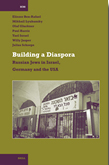Soviet-Jewish Acculturation Measure (SAM)
I have been interested for some time in how immigrants adjust to life in the new country and how different personal and environmental factors impact their adjustment. So far, I have focused primarily on how acculturation strategies and cultural involvement affect psychological adjustment and perception of social support in different immigrant groups, particularly from the former Soviet Union (where I was born).
As part of this work, in 1999, Elaine Shpungin and I developed an acculturation measure for this immigrant group called the Soviet-Jewish Acculturation Measure (SAM). We used the SAM in a study of older adult immigrants (see abstract). An English version of the SAM is available (see downloads box), but please obtain permission before using it for research. A Russian-language version and basic psychometric information can also be obtained via email: lyubanskym@gmail.com
|
SAM Downloads
and Related Links Download SAM ver 1: Download SAM-II: Download SAM-A A bibliography of psychological studies and other research on Soviet-Jewish immigrants. Books and theses on Russian-speaking immigrants, courtesy of Iosif Vaisman. My links to other Russian-related sites |
Paul (left) and I in Berlin:
August, 2005
In 2003, I was asked to work on a multi-national study of Russian-speaking Jewish immigrants titled, "Building a Diaspora: Russian Jews in Israel, Germany, and the USA" (see project homepage). At this time, a group of social scientists from Germany, Israel, and the United States undertook a major revision of the SAM. After several months of intense discussion, the research group finally settled on a final version, hereafter called the SAM-II (available in both Russian and English). Paul Harris and I then collected SAM-II data from almost 500 Russian-Jewish immigrants in New York, Chicago, and Atlanta, while our colleagues in Israel and Germany did the same in their respective countries. Data collection (N=1253) was completed by September, 2004. The quantitative findings, as well as political analysis, qualitative interviews with key informants, and a media analysis from all three countries were published in book form (available on Amazon) by Brill Press in October, 2004.

To facilitate further research using the SAM-II, excerpts from the book describing the psychometrics of the SAM-II are available online (please do not cite without permission).

Current project: Several colleagues and I are developing an adolescent version of the SAM (SAM-A) as part of a project on Russian-speaking immigrant youth in Germany. Psychometric data will not be available for some time, but the SAM-A should be available on-line shortly.